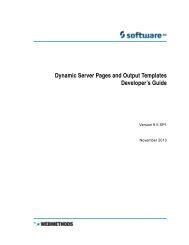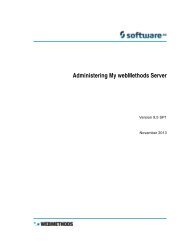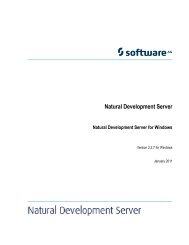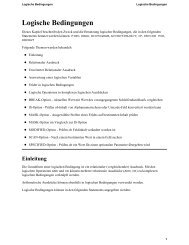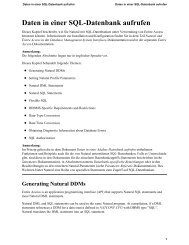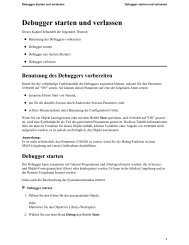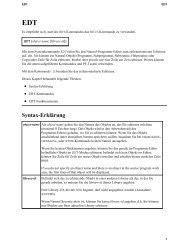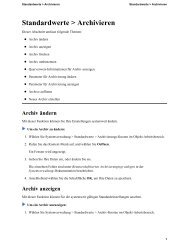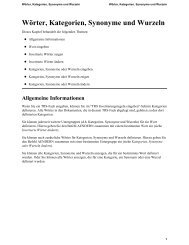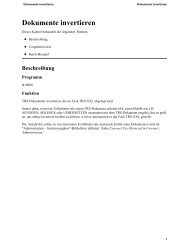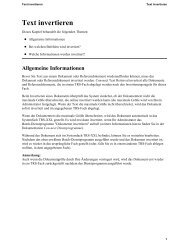Tamino XQuery User Guide - Software AG Documentation
Tamino XQuery User Guide - Software AG Documentation
Tamino XQuery User Guide - Software AG Documentation
You also want an ePaper? Increase the reach of your titles
YUMPU automatically turns print PDFs into web optimized ePapers that Google loves.
Text Retrieval<br />
for $a in input()/patient<br />
where $a/name = "Maier"<br />
return $a/name<br />
or you can use tf:containsText:<br />
for $a in input()/patient<br />
where tf:containsText($a/name, "Maier")<br />
return $a/name<br />
Unfortunately, there are at least four variants of the name which are all pronounced :<br />
"Maier", "Mayer", "Meier", and "Meyer". Instead of constructing long Boolean expressions that try<br />
to cover all existing homophones, you can use tf:phonetic in the scope of one of the search<br />
functions:<br />
for $a in input()/patient<br />
where tf:containsText($a/name, tf:phonetic("Maier"))<br />
return $a/name<br />
This query will return all patients whose names sound like .<br />
<strong>Tamino</strong> uses a set of rules to determine phonetic equivalency. There are rules pre-defined, which<br />
are explained in more detail in the reference documentation to tf:phonetic. These rules are suitable<br />
for German and English, but you can create your own set of rules. See the section Rules for Searches<br />
Using Phonetic Values and Stemming below.<br />
Note: You can not use tf:phonetic standalone, but only in the context of one of the following<br />
functions: tf:containsText, tf:containsAdjacentText, tf:containsNearText,<br />
tf:createAdjacentTextReference, tf:createNearTextReference,<br />
tf:createTextReference. This means that the result of calling this function in another<br />
context is unspecified and might change in a future <strong>Tamino</strong> version.<br />
Stemming<br />
A corpus with text in an inflecting language such as English or German often contains words in<br />
inflected forms: nouns are declined and verbs are conjugated: "The nightingales were singing in<br />
the trees." If you want to search for all occurrences of the verb "to sing" or of the nouns "nightingale"<br />
and "tree", you need to know how these words are inflected and derived. One method is to reduce<br />
any inflected form to its word stem. It is the stem to which morphemes are attached to construct<br />
a certain grammatical form: So "were" + "sing" + "-ing" indicates the past continuous tense of the<br />
verb "to sing".<br />
92<br />
<strong>XQuery</strong> <strong>User</strong> <strong>Guide</strong>



